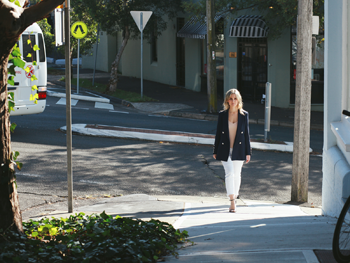Jaimie Bloch Decision Detox Interview

Do You Need To Take A Decision Detox?
We've seen the digital detox, diet detox and relationship detox, but what we're really in need of is a Decision Detox.
New research from HelloFresh reveals that Australians are unaware of how many daily decisions they make, with three in four (75%) of us thinking we make less than 60 decisions a day, but, in reality, we're making 70 conscious decisions in a day, and 226 unconscious decisions that are food related alone.
Unsurprisingly, more than a third of us (39%) wish there were fewer decisions to make in our daily lives.
With an aim to help make life easier for Aussies, HelloFresh has partnered with accredited behavioural psychologist, Jaimie Bloch, to create an easy-to-follow Decision Detox Program.
Jaimie Bloch says, "What we often overlook when we think about improving our mental, physical and emotional clarity, is how many decisions we're actually making in our lives. Daily decisions are a huge contributor to our ongoing stress, mental strain and emotional tension."
Jaimie confirms that stress over making little decisions is grounded in the phenomena of "decision fatigue."
"Our brains can't handle too much choice, or too many decisions, and therefore we become paralysed and end up not being able to make any decision at all. If we are using all of our mental energy every day on making countless decisions, we have less time and mental power to devote to other important things in our life."
A third (32%) of Australians admit to feeling overwhelmed by the number of decisions they're making in their life. Among the most stressful of decisions they make day-to-day: what to cook for dinner (43%), budgeting for groceries (44%), getting up in the morning to exercise (21%).
 Jaimie says, "We know that 'what to eat for dinner' decisions are up there with the most stressful choices of the day. It's okay to outsource decision making around mealtime and meal planning, which explains the growing popularity of meal-kits, like HelloFresh, in Australia".
Jaimie says, "We know that 'what to eat for dinner' decisions are up there with the most stressful choices of the day. It's okay to outsource decision making around mealtime and meal planning, which explains the growing popularity of meal-kits, like HelloFresh, in Australia".
Meal-kit boxes can be a lifesaver and can help eliminate both choices and decision making instantly. With meals planned out for you, recipes ready to go and the ingredients measured too, they really are the perfect first step to reducing the number of decisions required in a day".
The HelloFresh research also revealed that Australians aren't afraid to ask for help, with a third (31%) admitting they'd like a hand making daily decisions. Parents are the most in need of help, with close to half (45%) happy to seek assistance compared to 25% of those without kids.
Tom Rutledge, Founder & CEO, HelloFresh Australia says, "this is also reflected in customer feedback. After receiving meal kits for a few weeks, customers realise the benefits of streamlining dinner decisions. Customers claim the biggest benefit is the mental relief that comes from not having to think about what's for dinner".
The Decision Detox is a program designed to "help" with the 1-day Decision cleanse to eliminate menial choices in the daily routine. It focuses on the pillars of food, work and wardrobe which make up the largest chunks of our day-to-day decision making. The 3-day Decision Mind Program delves deeper into these topics, allowing Australians to build the skills to make better decisions in the long-run.
We've seen the digital detox, diet detox and relationship detox, but what we're really in need of is a Decision Detox.
New research from HelloFresh reveals that Australians are unaware of how many daily decisions they make, with three in four (75%) of us thinking we make less than 60 decisions a day, but, in reality, we're making 70 conscious decisions in a day, and 226 unconscious decisions that are food related alone.
Unsurprisingly, more than a third of us (39%) wish there were fewer decisions to make in our daily lives.
Jaimie Bloch says, "What we often overlook when we think about improving our mental, physical and emotional clarity, is how many decisions we're actually making in our lives. Daily decisions are a huge contributor to our ongoing stress, mental strain and emotional tension."
Jaimie confirms that stress over making little decisions is grounded in the phenomena of "decision fatigue."
"Our brains can't handle too much choice, or too many decisions, and therefore we become paralysed and end up not being able to make any decision at all. If we are using all of our mental energy every day on making countless decisions, we have less time and mental power to devote to other important things in our life."
A third (32%) of Australians admit to feeling overwhelmed by the number of decisions they're making in their life. Among the most stressful of decisions they make day-to-day: what to cook for dinner (43%), budgeting for groceries (44%), getting up in the morning to exercise (21%).
Jaimie says, "We know that 'what to eat for dinner' decisions are up there with the most stressful choices of the day. It's okay to outsource decision making around mealtime and meal planning, which explains the growing popularity of meal-kits, like HelloFresh, in Australia".
Meal-kit boxes can be a lifesaver and can help eliminate both choices and decision making instantly. With meals planned out for you, recipes ready to go and the ingredients measured too, they really are the perfect first step to reducing the number of decisions required in a day".
The HelloFresh research also revealed that Australians aren't afraid to ask for help, with a third (31%) admitting they'd like a hand making daily decisions. Parents are the most in need of help, with close to half (45%) happy to seek assistance compared to 25% of those without kids.
Tom Rutledge, Founder & CEO, HelloFresh Australia says, "this is also reflected in customer feedback. After receiving meal kits for a few weeks, customers realise the benefits of streamlining dinner decisions. Customers claim the biggest benefit is the mental relief that comes from not having to think about what's for dinner".
The Decision Detox is a program designed to "help" with the 1-day Decision cleanse to eliminate menial choices in the daily routine. It focuses on the pillars of food, work and wardrobe which make up the largest chunks of our day-to-day decision making. The 3-day Decision Mind Program delves deeper into these topics, allowing Australians to build the skills to make better decisions in the long-run.
 Interview with Jaimie Bloch
Interview with Jaimie Bloch
Question: What are the advantages of brain breaks?
Jaimie Bloch: Breaks are a great way to support rebuilding and renewing our mental and physical energy. Brain breaks are a great way to re-shift, refocus and realign both your mind and body during a work, study, or busy day. Breaks are not additive to our days, they are easy to implement and slot into the day, whether that be getting up and going for a walk or listening to music at your desk. Try implement them into your day and you will instantly notice the benefits. Research shows that the optimum time to implement brain breaks is around every 75-90 minutes during a busy mental period.
Question: What is considered a brain break?
Jaimie Bloch: Physical activity: like walking briskly to get a coffee or water
Grounding exercises: '5 senses check-in'
Using a mediation app such as 'Smiling Minds'
Listening to music on Spotify
Calling a friend or family member
Reading a book or magazine
Question: Are you surprised at how many conscious decisions we make in a day?
Jaimie Bloch: It is both surprising and also not surprising at all! There are so many decisions we have to make in a day from complex to simple tasks, that it makes a lot of sense that we are making many conscious but also unconscious decisions in a day. The research on food related decisions was really interesting. It has been found that we make 70 conscious and 226 unconscious food related decisions a day! I think a lot of people will find that surprising.
Question: How are these decisions affecting our lives negatively?
Jaimie Bloch: I don't think decisions affect our lives negatively, but rather being unaware of our mental health and how our brain can easily fatigue and not taking the right steps to take care of ourselves, mentally and emotional affects our live negatively. As a culture we focus a lot on being healthy and being aware of our unhealthy habits with eating, drinking and even social media, but we often overlook how our mentally health is and how we we are emotionally feeling. It is really important to bring awareness to mental health, and helping everyday Australians understand the impact daily decisions have on our mind. Just like your body, your brain can get tired. Every decision we make takes energy out of our internal "decision-making tank". This tank only has a finite supply of decision making energy per day before decision fatigue sets in. The more choices we are faced with, the more decisions we have to make, the more fatigued your mind becomes, causing your brain to look for decision shortcuts to conserve energy.
Question: Is this a relatively new trend in behaviour?
Jaimie Bloch: No. We have been making decisions from the beginning of time, and whilst our culture has evolved the inner workings of our brains remain the same. We are just faced with more choice than ever before. Decision making can just become more complicated in the modern world when we are faced with more choices, which then leads to busy days and schedules and more to fit in to our days in the same amount of time. The combination of unlimited choice and time constraints can cause more pressure around decisions and choices.
Jaimie Bloch: Every decision we make takes effort and depletes energy from our internal "decision-making tank". This tank only has a finite supply of decision making energy per day before fatigue sets in. Decision's made throughout the day can chip away at the reserves in your internal decision making tank and mental clarity. The more choices we are faced with, the more decisions we have to make, the more fatigued your mind becomes, causing your brain to look for decision shortcuts to conserve energy. A good indication you are suffering from decision fatigue is when your brain is tired it looks for mental shortcuts, either by going blank, when you can't make any decision or by making impulsive and quick decisions.
 Question: What is the impact of decision fatigue?
Question: What is the impact of decision fatigue? Jaimie Bloch: Researchers from Duke University found that these mental shortcuts lead people to make irrational decisions, specifically when that shortcut is making quick and impulsive decisions. Other times, our brain takes a shortcut by going blank and then making no decision at all. Too much choice, therefore, directly creates psychological and physiological stress in our body. Think about it: if we're using all of our mental energy every day making countless decisions, we have less time and mental power to devote to other important things in our life; education, relationships, exercise, work and overall wellbeing. All of these things contribute to the phenomenon of decision fatigue. This is where the implementation of a "Decision Detox" comes in. Just like cleansing and resetting our bodies through a diet detox, having a Decision Detox can be an easy and life changing way to reset and refocus our minds.
Question: What is involved in your decision detox program?
Jaimie Bloch: You may have noticed that you are feeling run down, overwhelmed or foggier than usual. Maybe you've noticed you are making more impulsive decisions, or you're not able to make decisions at all. Whatever your reason may be, both the 1-Day and 3-Day Cleanse will help you in supporting a realignment in your mindset. Created with HelloFresh, the Decision Detox is a program designed to "help" with the 1-day Decision cleanse to eliminate menial choices in the daily routine. It focuses on the pillars of food, work and wardrobe which make up the largest chunks of our day-to-day decision making. The 3-day Decision Mind Program delves deeper into these topics, allowing Australians to build the skills to make better decisions in the long run.
Question: Why are mornings the best time to make decisions?
Jaimie Bloch: Research into attention and cognitive clarity has found that we have increased brainpower in the first two hours of waking up. Sleep can help refill our decision making tanks so it makes sense that we would be more clear in the morning. However not everyone is a morning person, some people need a few hours for their brain to come online. Its important to know everyone is different but more people have more brain power in the morning, which would allow them to make more clear and conscious decisions.
Question: What are the advantages of repetition?
Jaimie Bloch: Repetition and routine helps us create habits that we can automatically engage in without having to think. Our brains work at our best when it knows what to do. Our brains respond well to repetition, our brain likes to predict for us. The brain is just like a muscle, we can train our brains to work more efficiently and successfully. Research has found that people who developed routines and habits are able to conserve their brain power and reduce everyday stress. The first step to creating this routine is setting it out on paper. Try setting up a routine for every other day to give yourself some variety, and keep the order of things flowing in a natural, logical way for your day.
Question: What are your five top tips for starting a decision detox?
Jaimie Bloch: Use your mornings wisely. Research has shown that we have more brainpower in the morning. Schedule big decisions, tasks, or important meetings for earlier in the day.
Utilise the power of routine, habits and checklists. Creating routines will help conserve mental energy whilst automating and simplifying menial tasks in your day. Creating checklists for everyday tasks will free up your mind for other more important things as well as reduce your daily stress.
Limit options. Too much choice can cause our brain to short circuit and take unhelpful mental shortcuts, such as impulse decisions or brain fog when we become unable to make any decisions at all.
Glucose is your friend. Have a high glucose snack before making any decision. Research has shown that glucose can help increase mental power and support decision making capabilities.
Reduce your everyday stress, take breaks. A little bit of stress can be beneficial to support motivation and improve mental performance in the short term. Long-term stress can be detrimental to our health and mental well-being. It is important to recognise when you are too fatigued or exhausted to achieve or complete anything. Build breaks into your day so that they are scheduled in rather than another decision to make. Breaks are a great way to de-stress, as well as support the brain to maintain its focus, maximise learning and consolidate information. Research has shown taking a 15-minute break every 90-minutes supports rebuilding and renewing expended mental and physical energy into our mind and body during a work or study day.
Interview by Brooke Hunter
MORE



